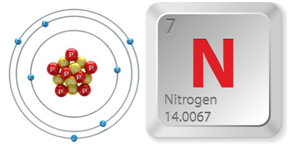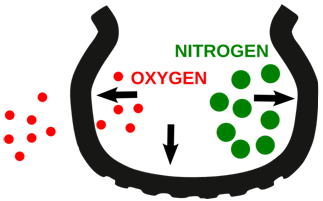Pros and cons of using Nitrogen to inflate your tires (Part 2)
Please click here for part one of our series on nitrogen fill for your tires.
Benefits of Nitrogen tire inflation
1. Provides more consistent inflation.
As much as compressed air is still widely used, it is important to note that one of the most detrimental properties of oxygen is the permeability of its molecules. The rate at which oxygen seeps out of the tires causes them to lose up to 3PSI per month. Nitrogen has significantly larger molecules than oxygen, being as much as four times larger than oxygen molecules.
This property makes nitrogen-filled tires unable to lose pressure through permeation no matter how long it takes. Therefore, it enables your tires to maintain optimum pressure for longer periods of time without the need to top them up constantly. Keeping the tire pressure constant goes a long way in ensuring the overall safety of your vehicle.
2. Prevents under inflation
Under inflation is a serious problem. Tires that have not been properly inflated tend to wear out faster. This is because the low pressure makes them misshapen and as a result, the tires come into contact with the ground at the wrong points. Driving around with under inflated tires can reduce their usable duration by up to 25%. You can expect your tires to remain at the optimal pressure when you inflate with nitrogen simply because unlike regular air, constant refills are not necessary because nitrogen does not migrate through the tires.

3. Improves the fuel economy of the vehicle.
A tire that has not been filled up to the required pressure faces a degree of resistance while moving. This is comparable to riding a bike whose tires have no air. You will use a lot of more energy to move due to the rolling resistance. The same scenario applies to under inflated tires of vehicles. You require a lot more fuel to propel the vehicle and therefore, you will generally spend more on fuel without even knowing it.
4. The pressure remains constant regardless of the temperature.
A common issue associated with tires that have been inflated with compressed air is the buildup of water vapor inside the tires. This comes as a result of condensation whereby the oxygen plays a part in the formation of water. When the tires heat up after continued use, the moisture in the tires also expands into vapor resulting in increased tire pressure. This can be detrimental to the handling of the car and might even lead to accidents if the tire bursts while driving. Compressed nitrogen is devoid of any other components and therefore, you can expect a more consistent inflation regardless of the temperature.

5. Does not corrode the metallic components of the tire.
It is important to note that the major reason why compressed nitrogen is somewhat more ideal than compressed air is the fact that oxygen promotes corrosion of the metallic components of the wheels. Therefore, nitrogen has the upper hand in this as it contains neither oxygen nor water and as a result, your rim will last significantly longer.
6. Increases steering, handling and braking.
When your tires are at an optimum pressure, the handling of your vehicle will be notably better. Full tires generally respond better to steering, handling and braking and reduce the risk of accidental tire bursts, which often lead to car crashes.
You can schedule an appointment with us.
Schedule Serivce
Our locations are:
· 106-01 Northern Blvd. Corona, NY 11368
· 79-20 Queens Blvd. Elmhurst, NY 11373
· 118-02 Merrick Blvd. Jamaica, NY 11434
· 79-20 108th St. Corona, NY 11368